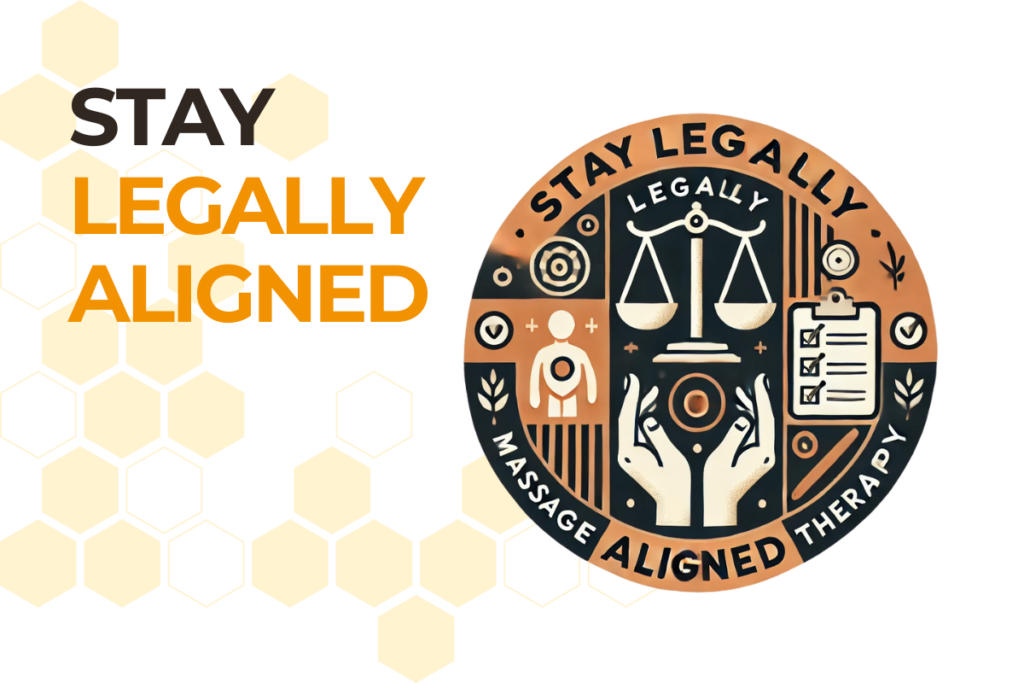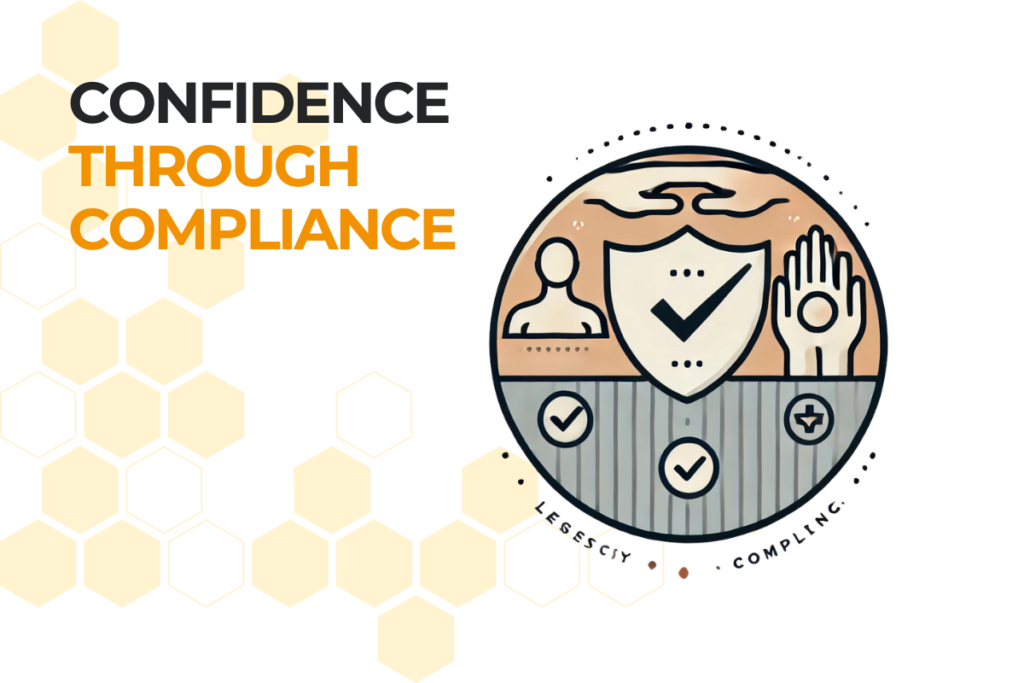Avoid Costly Legal Mistakes with the Right Knowledge
Legal compliance for massage therapy clinics is crucial for protecting your business, ensuring client trust, and avoiding costly legal consequences. Without proper safeguards, clinic owners risk fines, lawsuits, and even license suspension. Beyond the financial and legal repercussions, non-compliance can also damage your reputation, making it harder to attract and retain clients. Regulatory requirements can be complex and vary by location, covering everything from therapist licensing and data privacy to employment laws and health standards.
Failing to stay up to date with evolving laws and industry best practices can leave your clinic vulnerable to audits, disputes, or forced closures. Taking proactive steps to implement compliance measures not only mitigates these risks but also fosters a professional and ethical business environment that reassures clients and enhances your clinic’s credibility. This guide breaks down critical legal issues, highlights common pitfalls, and offers practical, step-by-step solutions to help you navigate compliance effortlessly, ensuring your business remains secure while allowing you to focus on delivering quality client care.
Understanding Licensing and Certification Requirements
State and Local Licensing
Each state and province has its own licensing requirements for massage therapy clinics and therapists. Failing to secure the correct licenses can result in hefty fines or forced closure.
Steps to Ensure Compliance:
- Check your state or province’s regulatory board for up-to-date licensing requirements.
- Ensure all practicing therapists hold valid licenses.
- Renew clinic and therapist licenses before expiration dates.
Professional Certification
While certification isn’t always legally required, obtaining credentials from recognized massage therapy organizations enhances credibility and client trust. Keeping records of therapist certifications helps avoid potential legal disputes.

Ensuring Client Confidentiality and Data Protection
Compliance with Privacy Laws
Handling sensitive client information comes with legal responsibilities. Laws like HIPAA (U.S.) and PIPEDA (Canada) mandate proper data storage and protection for legal compliance for massage therapy clinics.
Key Compliance Strategies:
- Use secure digital records systems that comply with industry privacy laws.
- Train staff on proper client confidentiality protocols.
- Implement password-protected electronic health records (EHR) to prevent unauthorized access.
Navigating Employment Laws and Worker Classification
Employee vs. Independent Contractor
Misclassifying workers can lead to tax penalties and labor disputes. Knowing the legal distinctions between employees and independent contractors prevents costly errors.
How to Determine Classification:
- Employees typically work under clinic-set hours and policies.
- Independent contractors have control over their schedules and client base.
- Consult a legal expert to structure worker agreements correctly for legal compliance for massage therapy clinics.
Compliance with Labor Regulations
Wage disputes and wrongful termination claims can be avoided by adhering to labor laws. Providing fair wages, benefits, and clear contracts ensures legal protection.
Adhering to Scope of Practice Guidelines
Defining the Scope of Practice
Every jurisdiction has specific guidelines about what massage therapists can and cannot do. Going beyond these limits can lead to legal liability.
Common Legal Violations:
- Providing medical diagnoses without a medical license.
- Using techniques outside the legally defined scope of massage therapy.
How to Stay Within Legal Boundaries:
- Regularly review state or provincial regulations on massage therapy.
- Clearly define services offered on your website and intake forms.
- Train staff to refer clients to appropriate medical professionals when needed.
Implementing Proper Documentation and Informed Consent Procedures
Importance of Accurate Record-Keeping
Proper documentation serves as legal protection in case of disputes or malpractice claims. Missing or incomplete records can jeopardize your clinic’s credibility.
Best Practices for Documentation:
- Maintain SOAP notes (Subjective, Objective, Assessment, Plan) for every session.
- Store client records securely for at least five years, as required in most jurisdictions.
- Use electronic documentation software to streamline record-keeping for legal compliance for massage therapy clinics.
Establishing Informed Consent Protocols
Clients must understand the scope of treatment and any potential risks before beginning therapy. Failure to obtain informed consent can lead to legal repercussions.
Steps to Ensure Compliance:
- Use clearly written consent forms explaining treatments, risks, and benefits.
- Obtain signed consent before every new treatment type.
- Document verbal and written consent in client records.

Maintaining Professional Boundaries and Ethical Standards
Establishing Clear Boundaries
Massage therapy is a personal service, making professional boundaries essential. Boundary violations can lead to legal complaints and damage your clinic’s reputation.
How to Maintain Professionalism:
- Use clear policies regarding draping, client interactions, and communication.
- Train staff on ethical behavior and professional client engagement.
- Address client concerns promptly and professionally.
Adhering to a Code of Ethics
Professional organizations provide ethical guidelines that help maintain industry standards. Following these guidelines reduces legal risks and builds trust.
Staying Updated with Health and Safety Regulations
Compliance with Sanitation and Hygiene Standards
Health departments enforce strict sanitation laws to prevent the spread of infections. Non-compliance can lead to clinic shutdowns and fines.
Best Practices:
- Clean and disinfect treatment rooms between each client.
- Regularly wash linens in high-temperature settings.
- Ensure all therapists follow hygiene protocols, including handwashing.
Regular Training and Certification
Health regulations evolve, and staying current ensures compliance. Regular staff training minimizes risks and maintains high service standards.
Developing a Risk Management Strategy
Obtaining Appropriate Insurance Coverage
Having professional liability insurance safeguards against legal claims. Business owners should also consider general liability and workers’ compensation insurance.
Establishing Procedures for Handling Complaints
Client complaints should be addressed before they escalate into legal disputes. A clear policy for handling issues prevents misunderstandings and builds trust.
Complaint Resolution Steps:
- Acknowledge concerns and document the complaint.
- Offer a resolution within a reasonable timeframe.
- Keep records of all complaint interactions for future reference.
Safeguard Your Clinic’s Future with Legal Awareness
Staying compliant with legal regulations isn’t just about avoiding fines—it’s about safeguarding your business, protecting your clients, and upholding your professional reputation. A single legal misstep can lead to financial penalties, loss of licensure, or even permanent damage to your clinic’s credibility. Proactively addressing these legal issues fosters trust with clients, reduces liability risks, and ensures operational stability.
Regularly reviewing evolving legal requirements, investing in staff training, and implementing robust compliance systems will not only keep your clinic running smoothly but also position it as a trusted leader in the industry. Legal compliance for massage therapy clinics is an ongoing commitment that, when managed effectively, creates a thriving, sustainable, and competitive business.
Frequently Asked Questions
Licensing requirements vary by state or province, but most regions require both a business license for the clinic and valid massage therapy licenses for all practicing therapists. Always check with your local regulatory board to ensure you’re compliant and renew licenses before they expire to avoid penalties.
Use secure, encrypted electronic health record (EHR) systems and ensure your team is trained in confidentiality protocols. In the U.S., compliance with HIPAA is essential, while Canadian clinics must follow PIPEDA. Limiting access to client data and regularly reviewing privacy policies are key steps.
Employees typically follow your clinic’s schedule, policies, and procedures, while independent contractors set their own hours and manage their client base. Misclassifying staff can lead to legal issues like tax penalties or labor disputes. Always consult a legal professional when drafting contracts.
Informed consent protects both the client and therapist by clarifying treatment goals, potential risks, and expectations. Always use clear, written consent forms and obtain signatures before new or modified treatments. Document all consent—both verbal and written—to remain legally protected.


